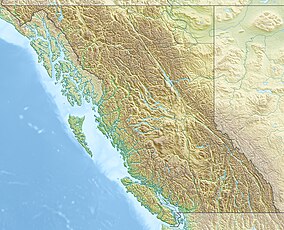| Pacific Rim National Park Reserve | |
|---|---|
| Réserve de parc national Pacific Rim | |
IUCN category VI (protected area with sustainable use of natural resources)[1] | |
 Pacific Rim National Park Reserve on Vancouver Island | |
Location of in British Columbia Location of in Canada | |
| Location | Vancouver Island, British Columbia, Canada |
| Nearest city | Tofino and Ucluelet |
| Coordinates | 48°38′10″N 124°46′09″W / 48.63611°N 124.76917°W |
| Area | 511 km2 (197 sq mi) marine: 221 km2 (85 sq mi) terrestrial: 290 km2 (110 sq mi) |
| Established | 1970 |
| Visitors | 1,163,362 (in 2022–23[2]) |
| Governing body | Parks Canada |
| Website | parks |
 | |
Pacific Rim National Park Reserve is a 511 km2 (197 sq mi) national park located in British Columbia, Canada, which comprises three separate regions: Long Beach, the Broken Group Islands, and the West Coast Trail. It is located in the Pacific Coast Mountains, which are characterized by rugged coasts and temperate rainforests.
Widespread vegetation found in the park includes western hemlock, Sitka spruce, western red-cedar, deer fern and sword fern. Animal species vary from marine and intertidal species, such as humpback whales and ochre sea star, to terrestrial mammals, such as Vancouver Island wolves. For recreational purposes, Long Beach is used for surfing and windsurfing, the Broken Group for sea kayaking, and the West Coast Trail for hiking, as well as camping in all areas and scuba diving in the winter months in the Long Beach and Broken Group areas.
The Wickaninnish Beach Provincial Park formed the nucleus upon which the national park was assembled. After years of negotiation between the federal government and the provincial government of W.A.C. Bennett, a breakthrough was reached after Jean Chrétien took over for Arthur Laing as the federal minister responsible for parks. British Columbia adopted the West Coast National Park Act in 1969, and the two governments signed an agreement in 1970 to create the park through land assembly and extinguishing forestry rights. Following protracted negotiations, the park was finally added to the National Parks Act in 2000, classified as a "park reserve" based on an accepted claim of certain rights to the area by the Nuu-chah-nulth Tribal Council.
- ^ "Protected Planet | Pacific Rim National Park Reserve Of Canada". Protected Planet. Retrieved 2020-10-13.
- ^ Canada, Parks. "Parks Canada attendance 2022_23 - Parks Canada attendance 2022_23 - Open Government Portal". open.canada.ca. Retrieved 2024-05-07.

